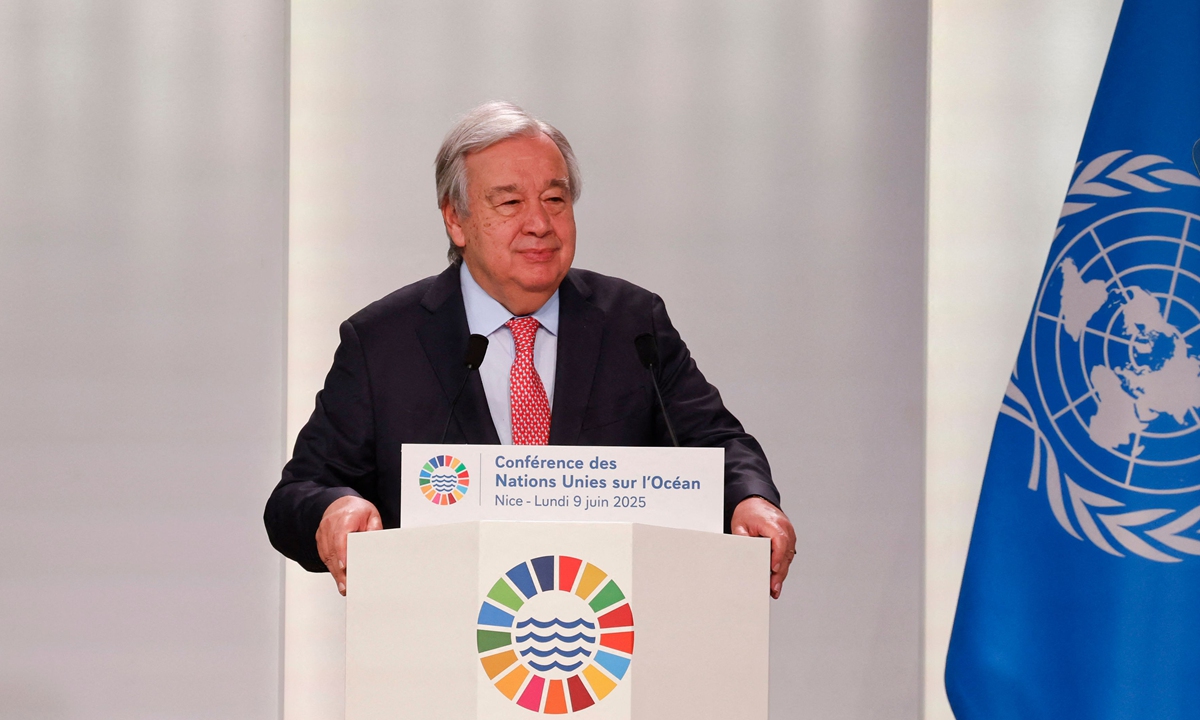UNOC3 kicks off in Nice, China brings wisdom in marine development
Country to release world's first deep-sea digital intelligent system for seamounts

UN general secretary Antonio Guterres addresses the opening session of the third United Nations Ocean Conference (UNOC3), which gathers leaders, researchers and activists to discuss how to protect marine life until June 13, at the Centre des Expositions conference centre in the French riviera city of Nice, on June 9, 2025. Photo: VCG
Having kicked off on Monday in Nice, France, the third United Nations Ocean Conference (UNOC3) is focusing on three core objectives: conserving marine biodiversity, eliminating harmful fisheries subsidies, and advancing the global "30x30" target, which is a bold goal by the UN to protect 30 percent of the world's land and ocean by 2030.
Chinese Vice President Han Zheng will attend the conference and plans to visit Spain from June 7 to 13, China's Foreign Ministry had previously announced.
During the conference, 10 plenary sessions, 10 special forums on marine actions and a series of side events will also be held in Nice.
China has made significant contributions to global marine environmental protection and sustainable economic development. This conference provides China an opportunity to share the nation's wisdom in maritime development and governance with other countries. China has proposed the vision of a maritime community with a shared future, and at the same time, it highlights the diversity of ocean utilization, Chen Xiangmiao, a research fellow with the National Institute for South China Sea Studies, told the Global Times.
Chen said that, on a regional level, China has actively promoted bilateral and multilateral maritime strategy issues, including fisheries agreements and environmental protection consultations, while making significant contributions to scientific research and environmental conservation.
A top priority at the conference will be to secure the 60 ratifications needed to bring into force the Agreement under the UN Convention on the Law of the Sea on the Conservation and Sustainable Use of Marine Biological Diversity of Areas Beyond National Jurisdiction. Adopted in 2023, the accord aims to safeguard marine ecosystems in international waters. So far, only 32 countries have ratified it. The deadline for reaching the 60-country threshold is September 20, according to the Xinhua News Agency.
China signed this legal document on the first day that the agreement was opened for signatures in 2023.
Chen said that China has participated in negotiations on international maritime agreements, and has played a major role in shaping conservation conventions. Furthermore, China has actively fostered global cooperation on climate change, hosted key topics at ocean conferences, and provided developing countries with scientific and technological support, including technical assistance, talent cultivation and capacity-building initiatives.
Domestically, the legal framework for biodiversity conservation has been continuously improved, with strengthened enforcement and intensified crackdowns on illegal wildlife trade. Protections have also been extended to biological wetlands, tidal flats and areas such as mangrove reserves and coral reef conservation zones, the expert said.
Marking the 17th World Oceans Day, a new report highlighting China's innovative ideas and practical experience in ocean governance was released in Shanghai on Sunday, Xinhua reported. Noting that this year marks the sixth anniversary of the proposal to build a maritime community with a shared future, Chu Beiping, president of Shanghai Maritime University, said China's vision offers new perspectives for global cooperation amid growing maritime challenges.
The second objective targets the prohibition of harmful fisheries subsidies, widely seen as a major driver of global fish stock depletion. While the World Trade Organization adopted an agreement on this issue in June 2022, it still requires formal ratification by two-thirds of its members - or 111 countries - with 101 having done so to date, according to Xinhua.
To close the financial gap and support ocean conservation, participants at the UNOC3 will discuss innovative funding instruments such as "Blue bonds" and "Blue loans" to advance a sustainable ocean economy.
On Sunday, the Ministry of Natural Resources of China released the "2025 China Ocean Economy Development Index," which indicates that China's ocean economic restructuring and upgrading index reached 131.0, marking a 1.8 percent year-on-year increase. This demonstrates further optimization of the marine industrial structure and continuous improvement in scientific and technological innovation capabilities, according to a report by Xinhua.
Meanwhile, the Xinhua report said China's breakthroughs in deep-sea technology continue to emerge. It revealed that during the UNOC3, China will officially release the world's first digital intelligent system for deep-sea seamounts. Jointly developed by the China Oceanic Affairs Administration and institutions including the Zhejiang Lab, this system marks China's first publicly available digital scientific and technological product in the deep-sea field.
An official from the administration said this system will fill the gap in the application of artificial intelligence technology in deep-sea exploration and is expected to accelerate the transition of deep-sea development into the digital and intelligent era.
Following the iterative upgrades of the manned submersibles Jiaolong and Striver, China's first domestically built drilling ship Mengxiang, meaning "dream," will embark on its first scientific expedition mission this year, further demonstrating China's capabilities in deep-sea access, exploration and development, the Xinhua report said.




